Ableism
Definition – Discrimination or prejudice against individuals with disabilities
Books Videos Podcasts Peer Reviewed Articles
Recommended Books
Waist-High in the World: A Life Among the Nondisabled
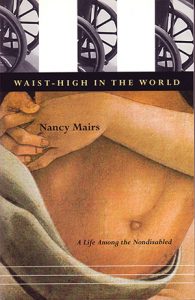 Author: Nancy Mairs
Author: Nancy Mairs
Published: December 22, 1997
ISBN: 807070874
ISBN13: 9780807070871
Pages: 224
“In a blend of intimate memoir and passionate advocacy, Nancy Mairs takes on the subject woven through all her writing: disability and its effect on life, work, and spirit.” – Beacon Press
The Rejected Body – Feminist Philosophical Reflections on Disability
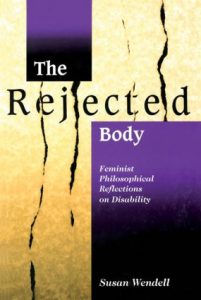 Author: Susan Wendell
Author: Susan Wendell
Published: July 4, 1996
ISBN: 415910471
ISBN13: 9780415910477
Pages: 214
“The Rejected Body argues that feminist theorizing has been skewed toward non-disabled experience, and that the knowledge of people with disabilities must be integrated into feminist ethics, discussions of bodily life, and criticism of the cognitive and social authority of medicine. Among the topics it addresses are who should be identified as disabled; whether disability is biomedical, social or both; what causes disability and what could ‘cure’ it; and whether scientific efforts to eliminate disabling physical conditions are morally justified.
Wendell provides a remarkable look at how cultural attitudes towards the body contribute to the stigma of disability and to widespread unwillingness to accept and provide for the body’s inevitable weakness.” – Routledge Taylor & Francis Group
Authoring Autism: On Rhetoric and Neurological Queerness
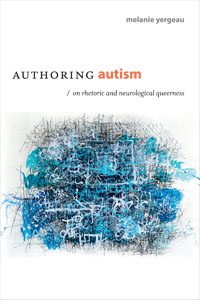 Author: Melanie Yergeau
Author: Melanie Yergeau
Published: January 15, 2018
ISBN: 822370204
ISBN13: 9780822370208
Pages: 312
“In Authoring Autism Melanie Yergeau defines neurodivergence as an identity—neuroqueerness—rather than an impairment. Using a queer theory framework, Yergeau notes the stereotypes that deny autistic people their humanity and the chance to define themselves while also challenging cognitive studies scholarship and its reification of the neurological passivity of autistics. She also critiques early intensive behavioral interventions—which have much in common with gay conversion therapy—and questions the ableist privileging of intentionality and diplomacy in rhetorical traditions. Using storying as her method, she presents an alternative view of autistic rhetoricity by foregrounding the cunning rhetorical abilities of autistics and by framing autism as a narrative condition wherein autistics are the best-equipped people to define their experience. Contending that autism represents a queer way of being that simultaneously embraces and rejects the rhetorical, Yergeau shows how autistic people queer the lines of rhetoric, humanity, and agency. In so doing, she demonstrates how an autistic rhetoric requires the reconceptualization of rhetoric’s very essence.” – Duke University Press
The Disability Rights Movement: From Charity to Confrontation
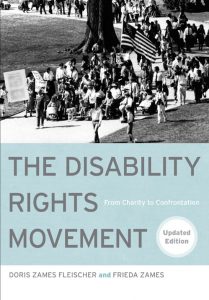 Authors: Doris Fleischer, Freida Zames
Authors: Doris Fleischer, Freida Zames
Published: June 3, 2011
ISBN: 1439907447
ISBN13: 9781439907443
Pages: 360
“In this updated edition, Doris Zames Fleischer and Frieda Zames expand their encyclopedic history of the struggle for disability rights in the United States, to include the past ten years of disability rights activism.The book includes a new chapter on the evolving impact of the Americans with Disabilities Act, the continuing struggle for cross-disability civil and human rights, and the changing perceptions of disability.
The authors provide a probing analysis of such topics as deinstitutionalization, housing, health care, assisted suicide, employment, education, new technologies, disabled veterans, and disability culture.
Based on interviews with over one hundred activists, The Disability Rights Movement tells a complex and compelling story of an ongoing movement that seeks to create an equitable and diverse society, inclusive of people with disabilities.”– Project Muse
Exile and Pride: Disability, Queerness, and Liberation
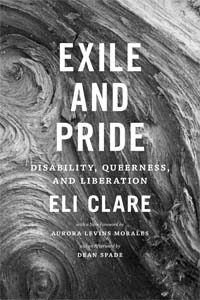 Authors: Eli Clare, Dean Spade (Afterword), Aurora Levins Morales (Foreword)
Authors: Eli Clare, Dean Spade (Afterword), Aurora Levins Morales (Foreword)
Published: August 7, 2015
ISBN: 822360314
ISBN13: 9780822360315
Pages: 216
“First published in 1999, the groundbreaking Exile and Pride is essential to the history and future of disability politics. Eli Clare’s revelatory writing about his experiences as a white disabled genderqueer activist/writer established him as one of the leading writers on the intersections of queerness and disability and permanently changed the landscape of disability politics and queer liberation. With a poet’s devotion to truth and an activist’s demand for justice, Clare deftly unspools the multiple histories from which our ever-evolving sense of self unfolds. His essays weave together memoir, history, and political thinking to explore meanings and experiences of home: home as place, community, bodies, identity, and activism. Here readers will find an intersectional framework for understanding how we actually live with the daily hydraulics of oppression, power, and resistance. At the root of Clare’s exploration of environmental destruction and capitalism, sexuality and institutional violence, gender and the body politic, is a call for social justice movements that are truly accessible to everyone. With heart and hammer, Exile and Pride pries open a window onto a world where our whole selves, in all their complexity, can be realized, loved, and embraced.” – Duke University Press
A Disability History of the United States (ReVisioning American History)
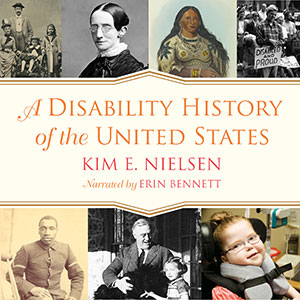 Author: Kim E. Nielsen
Author: Kim E. Nielsen
Published: October 1, 2013
ISBN: 807022047
ISBN13: 9780807022047
Pages: 240
“Covering the entirety of US history from pre-1492 to the present, A Disability History of the United States is the first book to place the experiences of people with disabilities at the center of the American narrative. Throughout the book, historian and disability scholar Kim E. Nielsen deftly illustrates how concepts of disability have deeply shaped the American experience—from deciding who was allowed to immigrate and establishing labor laws to justifying slavery and gender discrimination. Included are absorbing—at times horrific—narratives of blinded slaves being thrown overboard and women being involuntarily sterilized, as well as triumphant accounts of disabled miners organizing strikes and disability rights activists picketing Washington. Engrossing and profound, A Disability History of the United States fundamentally reinterprets how we view our nation’s past: from a stifling master narrative to a shared history that encompasses us all.” – Beacon Press
The Right to Maim: Debility, Capacity, Disability (ANIMA: Critical Race Studies Otherwise)
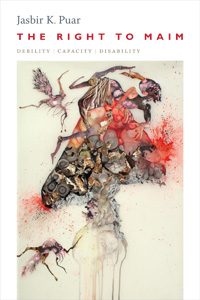 Author: Jasbir K. Paur
Author: Jasbir K. Paur
Published: November 3, 2017
ISBN: 822369184
ISBN13: 9780822369189
Pages: 296
“In The Right to Maim Jasbir K. Puar brings her pathbreaking work on the liberal state, sexuality, and biopolitics to bear on our understanding of disability. Drawing on a stunning array of theoretical and methodological frameworks, Puar uses the concept of “debility”—bodily injury and social exclusion brought on by economic and political factors—to disrupt the category of disability. She shows how debility, disability, and capacity together constitute an assemblage that states use to control populations. Puar’s analysis culminates in an interrogation of Israel’s policies toward Palestine, in which she outlines how Israel brings Palestinians into biopolitical being by designating them available for injury. Supplementing its right to kill with what Puar calls the right to maim, the Israeli state relies on liberal frameworks of disability to obscure and enable the mass debilitation of Palestinian bodies. Tracing disability’s interaction with debility and capacity, Puar offers a brilliant rethinking of Foucauldian biopolitics while showing how disability functions at the intersection of imperialism and racialized capital.” – Duke University Press
Recommended Videos
A Word Game to Communicate in Any Language: Ajit Narayanan
“While working with kids who have trouble speaking, Ajit Narayanan sketched out a way to think about language in pictures, to relate words and concepts in ‘maps.’ The idea now powers the FreeSpeech app, which can help nonverbal people communicate.” – TED 2013
Lives Worth Living: Eric Neudel
“People with disabilities are one of the largest minorities in the United States. But for most of American history, they occupied a sub-class of millions without access to everyday things most citizens take for granted: schools, apartment buildings, public transportation, and more. Some were forcibly sterilized under state laws. Others were committed to horrifying institutions where they were left and forgotten.” – Independent Lens, PBS
Overcoming Ableism, What You Don’t Know As An Able Bodied Person: Naty Rico
“Naty Rico is a third year Sociology and Education double major. She was born and raised in South Los Angeles, to parents who immigrated here from Mexico. As a first generation, Latina woman with a physical disability, Naty managed to get accepted and enroll into UCI in 2012, with the help of her community back home.
While her three years at UCI have not been easy, Naty has managed to overcome structural barriers and has become an advocate for the differently able community. After she graduates and receives her Bachelors from UCI, Naty hopes to enroll into grad school and continue doing work focused on the differently able community. She plans on obtaining a Ph.D in Sociology or Education, with an emphasis in Disability Studies, and giving back to the community that helped her get to where she is, and is supportive of where she’s headed.” – TEDx UC Irvine
When We Design for Disability, We All Benefit: Elise Roy
“I believe that losing my hearing was one of the greatest gifts I’ve ever received,” says Elise Roy. As a disability rights lawyer and design thinker, she knows that being Deaf gives her a unique way of experiencing and reframing the world — a perspective that could solve some of our largest problems. As she says: “When we design for disability first, you often stumble upon solutions that are better than those when we design for the norm.” – TEDx MidAtlantic
Deaf in the Military: Keith Nolan
“Keith Nolan always wanted to join the United States military. The challenge: he is Deaf, which is an automatic disqualification according to military rules. In this talk, he describes his fight to fight for his country. (In American Sign Language with real-time interpretation by Rita Alexander)” – TEDx Islay
Why I Speak Up about Living with Epilepsy: Sitawa Wafula
“Once homebound by epilepsy, mental health advocate Sitawa Wafula found her strength in writing about it. Now, she advocates for others who are yet to find their voices, cutting through stigma and exclusion to talk about what it’s like to live with the condition.” – TED Nairobi Ideas Search
Recommended Podcasts
Details of each podcast were taken directly for each podcast’s respective website.
Podcast: The Liturgists Podcast
Episode: Ableism
Created: February 6, 2017
Duration: 1 hour, 19 minutes, 48 seconds
Overview: This episode is all about ableism–the conscious and unconscious ways that people tend to discriminate against disabled people. Ginny Owens joined us to talk about her experiences as a blind muscian living and working in Nashville. Heather Avis told us about her children with Down syndrome, and how people respond to them. Michele in NYC shared her perspective as a queer, intersectional, disabled activist.
Listen: Click here
Podcast: Disability Visibility Project
Episode: Invisible Disabilities (Ep. 17)
Created: January 29, 2018
Duration: 31 minutes and 20 seconds
Overview: Today’s episode is about invisible disabilities with Tiffany Peterson and Linda Williams. Tiffany and Linda share their lived experiences as women with invisible disabilities, the misconceptions about invisible disabilities, and the need for language and symbols about disability that we can all identify with such as iridescent amoebas giving side-eye (listen to find out more).
Listen: Click here
Podcast: Disability Visibility Project
Episode: Accessibility and the American Disability Act (Ep. 18)
Created: February 11, 2018
Duration: 36 minutes and 18 seconds
Overview: Today’s episode is about accessibility and the Americans with Disabilities Act with Lia Seth and Dara Baldwin. Lia shares her experiences navigating public spaces as person with an invisible disability and a recent experience at a music venue that shows what accessibility should be all about. Dara, a disability rights policy analyst, gives an overview of HR 620, the ADA Education & Reform Act of 2017, and what’s at stake for the disability community. Please note: The status of the bill has changed since the recording of Dara’s interview.
Listen: Click here
Podcast: With Friends Like These
Episode: Talking Ableism, Hashtag Appropriation and Rom-Coms with Keah Brown
Created: April 13, 2018
Duration: 59 minutes and 50 seconds
Overview: On this week’s podcast, Ana sat down with writer, journalist and disability rights activist Keah Brown for a difficult conversation about the erasure of disability, ableism, and much more. The jumping off point for their discussion is a piece Keah wrote about loving romantic comedies even though they perpetuate an ideal body image to which she can aspire but never achieve. However, she also noted that since writing the piece two years ago, her thoughts on body positivity and self-love have evolved.
Listen: Click here
Podcast: Doin’ The Work: Frontline Stories of Social Change
Episode: Vilissa Thompson, LMSW – Black Disability, Disabled Women of Color, Empowerment, Advocacy (Ep. 8)
Created: August 6, 2018
Duration: 33 minutes and 53 seconds
Overview: In this episode, I talk with Vilissa Thompson, founder and leader of Ramp Your Voice!, a self-advocacy and empowerment movement for people with disabilities. We discuss Vilissa’s work to educate social workers, educators, and medical professionals about being helpful, rather than harmful, to disabled people, especially disabled women of color. Vilissa explains how the intersection of racism and ableism negatively impact this population and she shares steps that people can take to educate themselves to be allies and advocates for change. She also shares about creating the hashtag #DisabilityTooWhite and the Black Disabled Woman Syllabus. I hope you enjoy the conversation.
Listen: Click here
Podcast: Disability Incorporated, A Podcast from INCLUDEnyc
Episode: Navigating Life: Thoughts on education, ableism, and advocacy
Created: June 26, 2018
Duration: 35 minutes and 30 seconds
Overview: Tyrese Alleyne-Davis is currently a graduating senior at the Henry Viscardi School in Long Island, NY. He has triplegic cerebral palsy which requires him to use a wheelchair. For the past 10 years, he has been a public speaker, giving keynote addresses for many children’s organizations such as the Starlight Children’s Foundation, S.K.I.P. of NY, New Alternatives for Children, and INCLUDEnyc. Earlier this year, he had the distinct pleasure of addressing legislators in Albany, NY advocating for 4201 State Funded Schools. Additionally, Tyrese has had the opportunity to address the Black Law Student Association at Harvard Law School and speak at Columbia University’s Disability Caucus. Last summer, Tyrese was one of twenty high school students chosen out of 500 applicants to intern at the Brooklyn District Attorney’s Office.
Academically, Tyrese has soared, being inducted into the National Juniors Honor Society and receiving multiple college scholarships from CACNY, The Options Center, and the Henry Viscardi School. In the fall, he will be attending NYU on a full scholarship and intends to study communications and sociology. Tyrese has dreams of becoming an advocacy lawyer, concentrating on elevating the rights of the disabled community.
Listen: Click here
Peer Reviewed Articles
- Othering, Ableism & Disability: A Discursive Analysis of Co-Workers’ Construction of Colleagues with Visible Impairments
- Disability, Embodiment and Ableism: Stories of Resistance
- Animals, Ableism, Activism
- Immigration and Disability: Ableism in the Policies of the Canadian State
- “They Never Pass me the Ball”: Exposing Ableism through the Leisure Experiences of Disabled Children, Young People and Their Families
- Valuing Old Age Without Leveraging Ableism